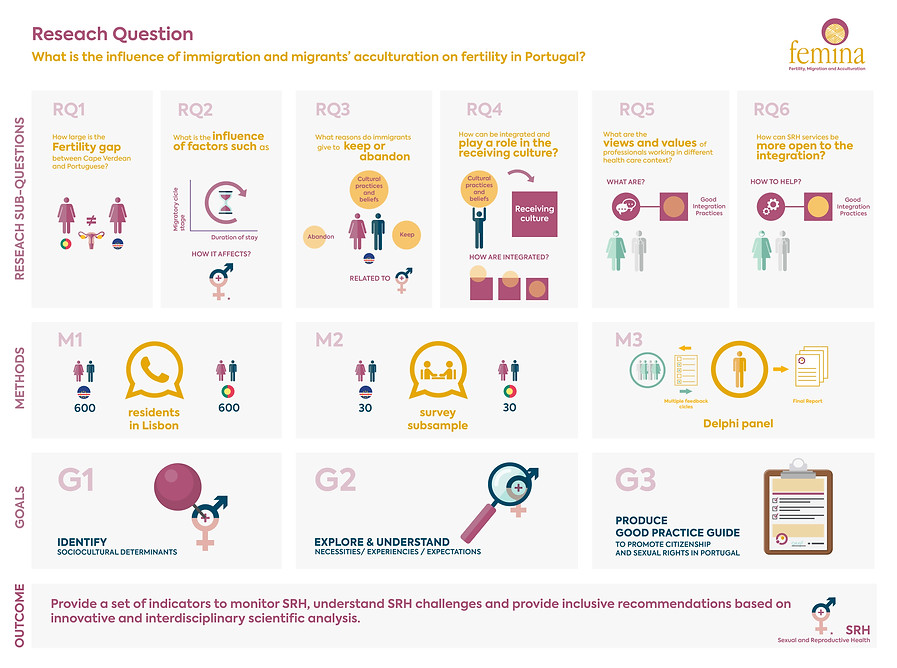




FEMINA stands for FErtility, MIgratioN and Acculturation. The existing knowledge on the interplay among immigration, acculturation, and fertility is new and inconsistent, particularly regarding the sociocultural constraints to fertility. The FEMINA project emerges from three main socio demographic factors: 1) declining fertility in Portugal, 2) the structural changes of the country over the last four decades, and 3) the significant role of immigration in increasing birth rates. Therefore, it was designed to address the complex factors of social, cultural and institutional order which influence the sexual and reproductive health (SRH) experiences and expectations among Cape Verdean and Portuguese Families.
FEMINA (2018-2021) will use a comprehensive approach exploring simultaneously the components of SRH, namely regarding identities, perceptions and practices of both women and men among lay people (Portuguese natives and Cape Verdean immigrants) and relevant experts and stakeholders.
GOALS
G1. To identify social determinants of sexual and reproductive health among Cape Verdean immigrant and Portuguese native men and women of reproductive age;
G2. To gain understanding of the diversity of the sexual and reproductive experiences and expectations of Cape Verdean immigrant and Portuguese native men and women of reproductive age, considering the singularities of their migratory, social and family dynamics;
G3. To produce recommendations for policy makers, employers and service providers on how to better address the sexual and reproductive health needs of Portuguese-born and immigrant populations.
METHODS
The study will address these goals using a mixed methods approach, including:
M1. A cross-sectional telephone survey with a probabilistic sample of 600 Cape Verdean immigrant and 600 Portuguese native women and men (women aged 18 to 49 and men aged 18 to 54), residents in the Greater Lisbon Area;
M2. A qualitative research through in-depth interviews with a subsample of 30 Cape Verdean immigrants and 30 Portuguese native men and women;
M3. A Delphi technique for finding consensus on good practices for sexual and reproductive health with experts and stakeholders from relevant related areas of knowledge and intervention.
Data will be used to produce a comprehensive set of indicators to monitor SRH in Portugal, to foster a greater understanding of its challenges to policy and decision makers, and to provide targeted recommendations to promote inclusive and migrant sensitive SRH services.




Intersectional approach to the sexual and reproductive experiences and expectations among Cape Verdean and Portuguese families
The FEMINA project (PTDC/SOC-SOC/30025/2017) was granted by Fundação para a Ciência e a Tecnologia, I.P. with national funding.
Host institution: Centro de Investigação e Estudos de Sociologia (CIES-Iscte), ISCTE - Instituto Universitário de Lisboa (Iscte)
Participating Institution: Instituto de Saúde Ambiental (ISAMB) / Associação para Investigação e Desenvolvimento da Faculdade de Medicina (AIDFM/FM/ULisboa)
FEMINA is complementary to the project ProCima (PROmoting Citizenship and sexual rights in IMmigrAnt populations), funded by the Asylum, Migration and Integration Fund, and which aims to contribute to the integration of immigrant populations in Portugal through the promotion of Sexual and Reproductive Health in an integrated approach to health and human rights.